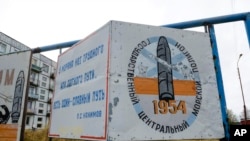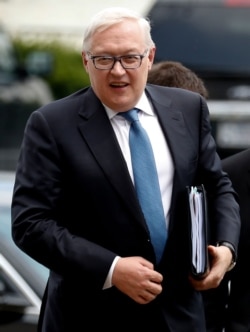Russia told an agency that verifies a ban on nuclear tests that a military test accident in the country's north this month was none of its business and that handing it any radiation data was voluntary, Interfax news agency reported Tuesday.
The Vienna-based Comprehensive Nuclear-Test-Ban Treaty Organization (CTBTO) said on Monday that two Russian monitoring sites closest to the mysterious explosion went offline days after the blast, soon followed by two more, fueling suspicions that Russia tampered with them.
The CTBTO said on Tuesday the radioactive-particle sensors of at least one of the four Russian monitoring stations in question were transmitting again.
Russia's state nuclear agency, Rosatom, has acknowledged that five of its nuclear workers were killed in the Aug. 8 explosion during a rocket engine test near the White Sea in far northern Russia. Two Russian military personnel were also reported to have been killed.
There has been contradictory information about the accident's consequences. The Defense Ministry initially said background radiation remained normal after the incident, but Russia's state weather agency said radiation levels in the nearby city of Severodvinsk had risen by up to 16 times.
Deputy Foreign Minister Sergei Ryabkov said on Tuesday that the accident was not a matter for the CTBTO, which first reported that the radiation monitoring stations went silent, according to Interfax.
"It's essential to keep in mind that handing over data from our national stations which are part of the international monitoring system is entirely voluntary for any country," Interfax cited Ryabkov as saying.
The CTBTO's mandate only covered the Comprehensive Nuclear-Test-Ban Treaty or national testing moratoriums, Ryabkov added. The treaty was adopted by the U.N. General Assembly in 1996, but has not yet entered into force due to some countries either not signing or ratifying it.
The Aug. 8 accident "should have no connection" to CTBTO activities, Ryabkov said, adding that the agency's mandate did not extend to weapons development.
"Exhaustive explanations about what happened and what the consequences were have been given by the relevant structures," said Ryabkov, and the mysterious accident had posed no risks to the environment or people.
Separately, the Kremlin said there was nothing to worry about and that it was confident that government agencies in charge of the relevant radiation monitoring stations had been doing their job correctly.
President Vladimir Putin said on Monday there was no risk of increased radiation levels, but that all necessary safety measures were being taken.
The Defense Ministry, which oversees the work of the monitoring stations, has not responded to a Reuters request for comment.






